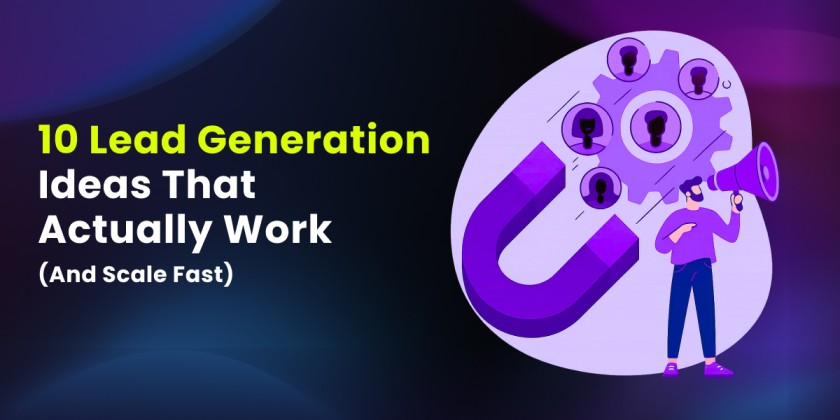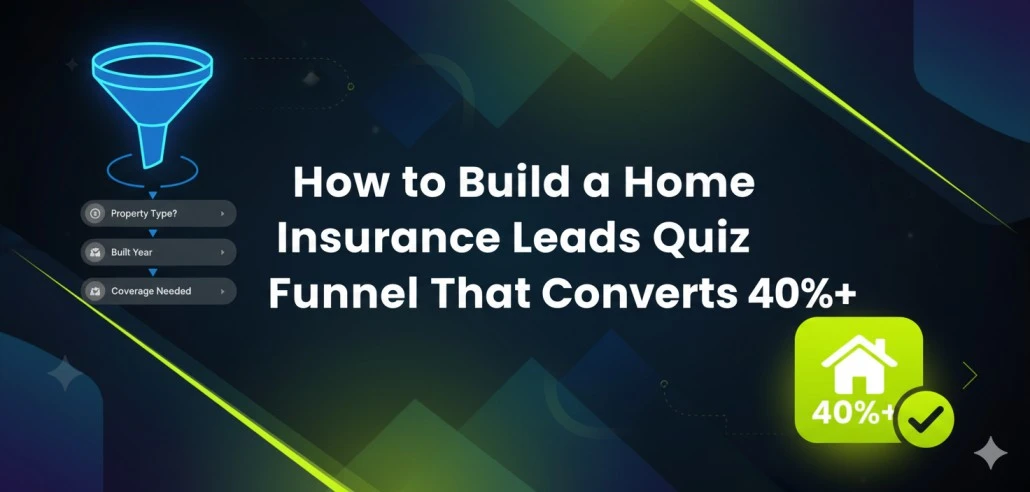You can be the best plumber in town, but if you’re not showing up when people need you most, you’re invisible.
The problem? Most plumbers either wait for referrals or rely on overpriced lead platforms. And that means:
-
- Lost calls go unanswered
- Your website doesn’t load fast enough
- People bounce before booking
In this guide, I’ll walk you through 11 specific strategies that work right now, from building landing pages for “emergency intent” to turning missed calls into booked jobs.
TL;DR: How to Get More Plumbing Leads (Fast)
- Create landing pages for emergencies like “no hot water” or “burst pipe”
- Target micro-keywords like “leaking faucet Dallas” instead of broad terms
- Recover missed calls with auto follow-up forms or call-back offers
- Retarget visitors who didn’t book the first time with Facebook or Google ads
- Collect reviews + job photos and add them to your pages for more trust and visibility
These strategies work, especially when paired with fast, mobile-first landing pages built to convert.
Why Plumbing Leads Matter More Than You Think
Every call you miss, every website visitor who doesn’t book, that’s a job lost.
In plumbing, leads aren’t just “potential customers.” They’re often people who:
- Need urgent help
- Are ready to pay today
- Will likely become repeat clients (or refer others)
That’s why generating the right kind of leads (local, specific, and high-intent) is more valuable than dumping money into broad ads or chasing random clicks.
Instead of relying on lead marketplaces (where you’re just one of five options), these strategies help you:
- Own your pipeline
- Build trust earlier
- Book jobs faster
With that in mind, let’s break down 11 strategies you can start using right away, even if you’re a one-person shop.
11 Strategies to Get Plumbing Leads That Actually Work
These aren’t recycled marketing tips. These are field-tested tactics built for local plumbing businesses, where speed, trust, and timing make or break the deal.
Let’s break them down:
1. Use “Emergency Intent” to Your Advantage
Leads for plumbers don’t usually come from people planning ahead. They come from panic. A leaking pipe, a clogged toilet, or no hot water. Most of these searches happen in the middle of a small crisis.
That’s why it’s not enough to just have a website. You need fast, focused pages that match exactly what someone is searching for, and load instantly on their phone.
Let’s say someone Googles “emergency plumber for clogged toilet.” If your page headline says “Need Help With a Clogged Toilet?” and has a big “Call Now” button, you’re already ahead of 90% of plumbers in your area.
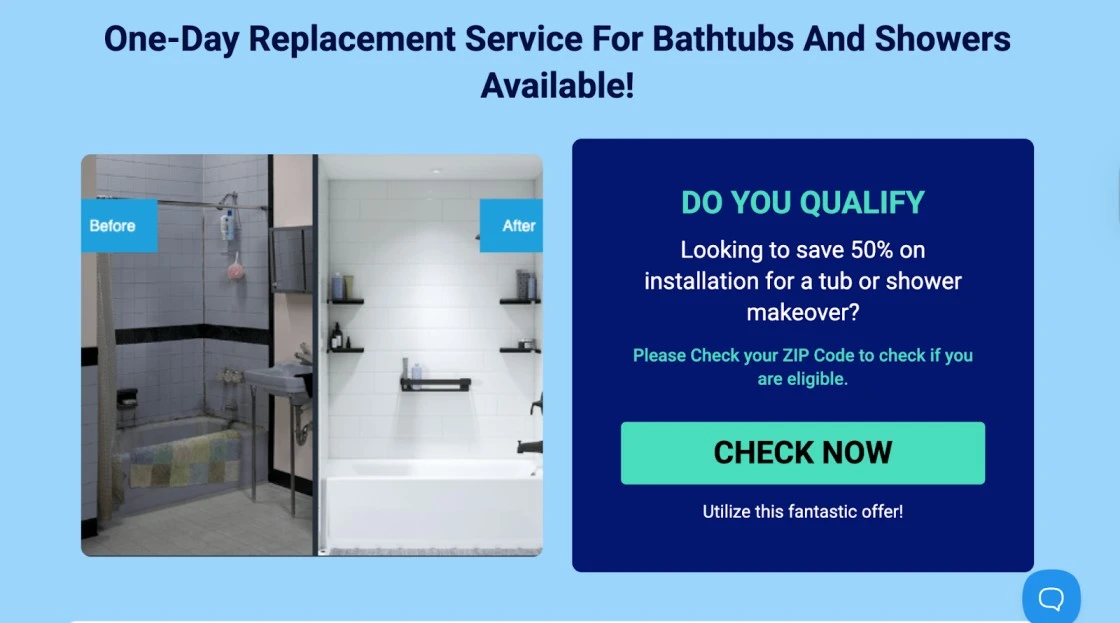
Instead of sending everyone to the same homepage, set up a few simple landing pages tailored to different issues, like:
- Water heater problems
- Overflowing sink or drain
- Pipe leaks or burst pipes
Each page should have:
- A clear, specific headline
- A short form (name, phone, issue)
- One-click-to-call button (especially on mobile)
- Optional but powerful: photos of past work, reviews, or service areas
This setup gives customers confidence they’re in the right place — and makes it easy for them to take action right away.
2. Get Found for “Micro Keywords” That Actually Bring Jobs
Most plumbers focus on ranking for big, obvious keywords like “plumber in Austin” or “emergency plumbing service.” But those are competitive, and honestly, too broad.
The leads you really want are the ones searching for specific problems in your area, like:
- “Toilet leaking from base Houston”
- “Garbage disposal install near me”
- “Fix water pressure kitchen sink Dallas”
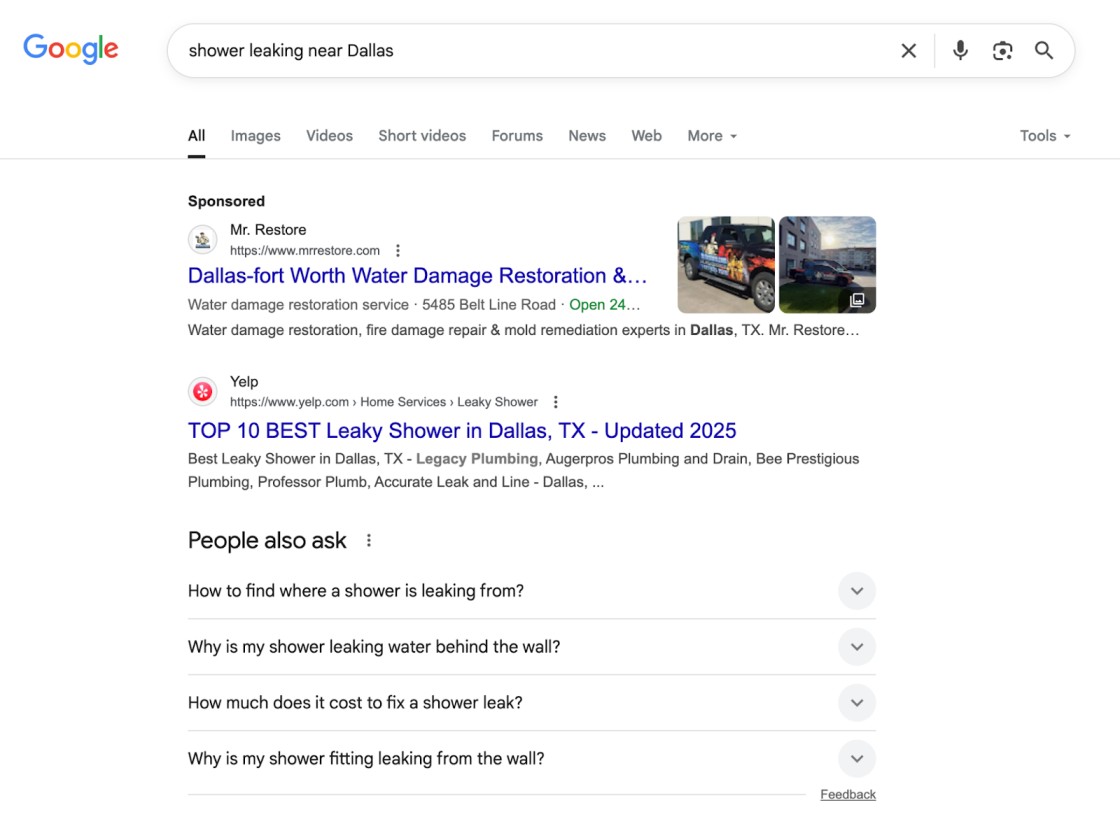
These longer, more detailed searches are called micro keywords. They don’t get huge traffic, but the people searching them are ready to book right now, not just comparing providers.
The best way to target these?
Create short, dedicated pages (or blog-style answers) for each issue. Think of them as mini service pages. A few real examples:
- A guide to “Why your toilet might be leaking from the base” with a CTA to book an inspection
- A landing page titled “We Install Garbage Disposals in Dallas—Flat Rate Pricing”
- A page for “Low Water Pressure Repair” that includes a quick diagnostic checklist
Even better if you can add a few job photos or a short before-and-after story from a past customer. That shows you’ve solved the problem before, and builds instant trust.
Google loves specific answers. Customers do too.
3. Turn Missed Calls Into Leads (Before They Call Someone Else)
A huge number of plumbing leads come in by phone, and many of them never turn into jobs. Why? Because no one picks up.
Whether you’re on another job, driving, or off-hours, missing a call often means losing the lead. And most people won’t leave a voicemail or wait for a callback. They just move on to the next plumber on Google.
But you can turn this around with a simple system:
- Use call tracking to log every missed call
- Set up an automated SMS or email follow-up that says something like: “Sorry, we missed your call. You can book a plumber now through this quick form.”
- Link that message to a mobile-friendly landing page where they can share their issue, availability, and contact info
This way, even if you miss the call, the lead still lands in your inbox.
Some plumbers also add a QR code on their van or business card that sends people to the same quick-booking form, another small way to catch leads on the go.
4. Follow Up With Visitors Who Didn’t Book (Automatically)
Not every lead will call or fill out your form on the first visit. Sometimes they’re comparing prices. Sometimes they get distracted. And sometimes they’re just not ready yet.
But just because they left doesn’t mean they’re lost.
If you install a simple tracking pixel on your landing pages (from Facebook or Google), you can run retargeting ads that show up later, when they’re back on Facebook, Instagram, or browsing the web.
Here’s what that might look like:
- Someone visits your “water heater repair” page but doesn’t call
- Later that day, they see an ad on Facebook that says: “Still no hot water? Get $25 off your water heater service today. Book Now!”
- They click, return to your site, and this time, they book
It’s a second chance—and one most plumbers don’t take.
You can also experiment with popups that trigger as the visitor is about to leave your page. Offering a quick coupon or “We’re available now” message can catch people before they bounce.
5. Use Lead Platforms (But Don’t Rely on Them)
Sites like HomeAdvisor, Angi, or Thumbtack can get you leads, but they come with strings attached:
- You’re competing with 3–5 other plumbers for the same job
- You pay per lead, even if they don’t answer
- You don’t own the customer relationship, they do
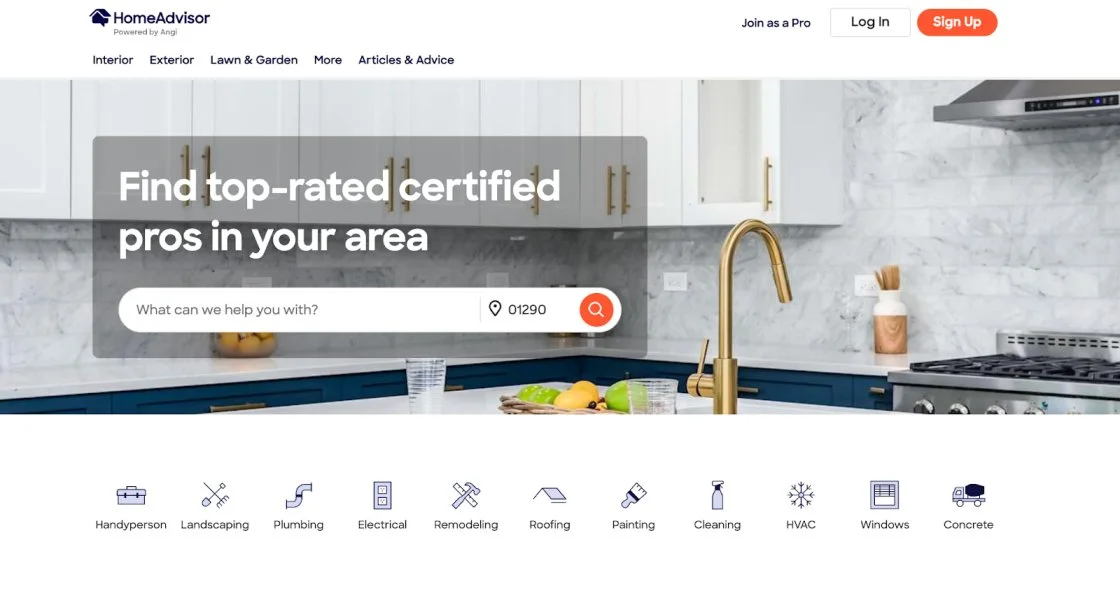
That doesn’t mean you should ignore them completely. But treat them as supplements, not your main source of work.
Here’s the smart play:
Run your lead gen on these platforms, but send every lead to a branded landing page you own. For example:
- After a Thumbtack quote, follow up with a link to your landing page where they can book directly
- Use that page to highlight reviews, pricing, and availability, making it easier for them to choose you over the others
- Include a short form so they can enter your CRM, and you can remarket to them later
Over time, this helps you build your own pipeline while still capturing volume from lead marketplaces.
Bonus idea: If you do volume work, like water heater installs or sewer inspections, test Google Local Services Ads, which are pay-per-call and tend to convert higher than basic Google Ads.
Here’s a landing page you can create with LanderLab:
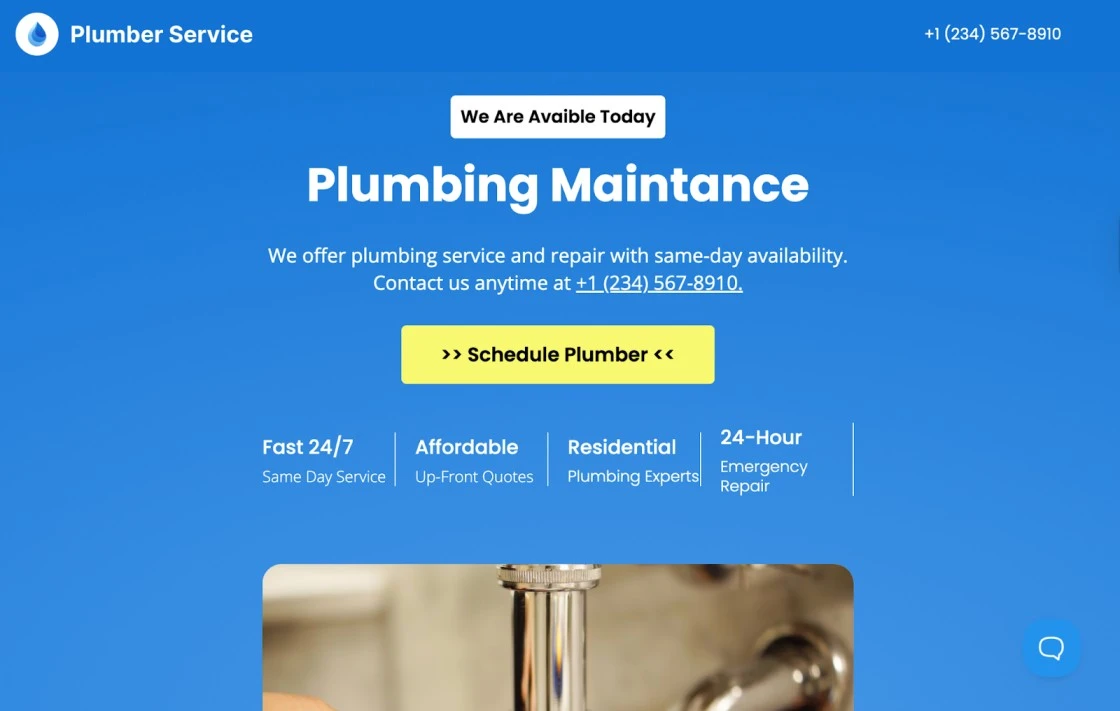
6. Capture “Not-Now” Visitors With Smarter Forms
Not everyone who lands on your site is ready to book today.
Some are just comparing rates. Others are looking to schedule work next week or “sometime soon.” If your form treats every lead the same, you’ll either lose them… or waste time chasing cold ones.
That’s where smart forms come in.
Instead of just asking for a name, phone number, and issue, try adding one extra question:
“When do you need this service?”
- Today
- Within 2–3 days
- This week
- Just getting a quote
This simple filter helps you prioritize hot leads while still collecting info from future customers. It also makes your follow-ups more relevant:
- Urgent job? Call right away
- Quote seekers? Send a pricing page or follow up next week
- “Just browsing”? Add them to an email drip with seasonal offers or maintenance tips
If you’re using a tool like LanderLab, you can easily build forms with conditional logic, showing different messages or redirecting based on urgency.
It’s a small tweak that leads to better conversations, less wasted time, and a more qualified pipeline.
7. Partner With Local Businesses Who Call Plumbers Often
Everyone talks about “referrals,” but let’s be honest, most plumbers just hope they happen.
Instead of waiting for word-of-mouth, build relationships with local businesses that regularly need plumbing help, and make it easy for them to send you leads.
Here’s who to target:
- Real estate agents who need quick fixes before closings
- Airbnb hosts who want someone on-call for guest emergencies
- HVAC or appliance repair techs who run into plumbing issues on the job
- Property managers who need someone reliable for multiple units
Now here’s the key: don’t just hand them a card. Create a private landing page just for their referrals.
Example: yourplumbingbusiness.com/airbnb-partner
On that page, they can:
- Submit a job request directly
- Include the tenant or guest contact info
- Get a faster response or even a referral discount
You could even offer a small referral fee or priority booking for partners who send jobs consistently.
These pages make the partnership feel official and help you track how many leads each source sends.
8. Turn Job Photos Into Local SEO Magnets
Most plumbers finish the job and move on. But if you take just one photo before leaving, and post it with a short description on your Google Business Profile. Let’s say you upload a photo and caption it:
“Replaced water heater in South Austin duplex, 3-hour turnaround.”
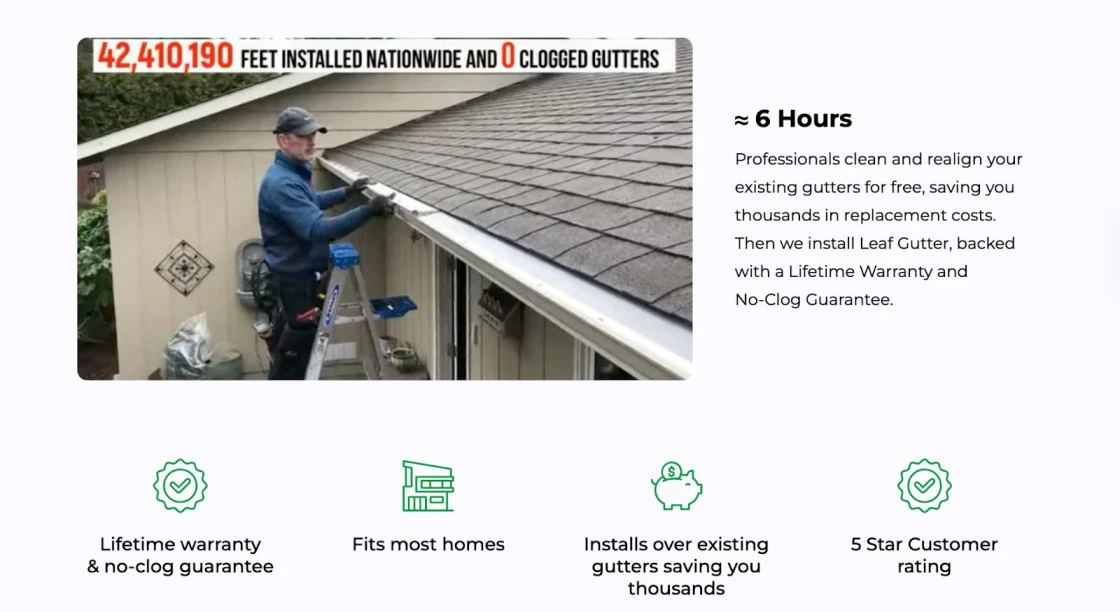
That image now helps you show up for local searches like:
- “water heater install near me”
- “Plumber South Austin”
- “fast plumbing repair”
Google favors location-based, image-rich content, especially for mobile searches with strong intent. And most plumbing competitors never update their profiles, which gives you a real edge.
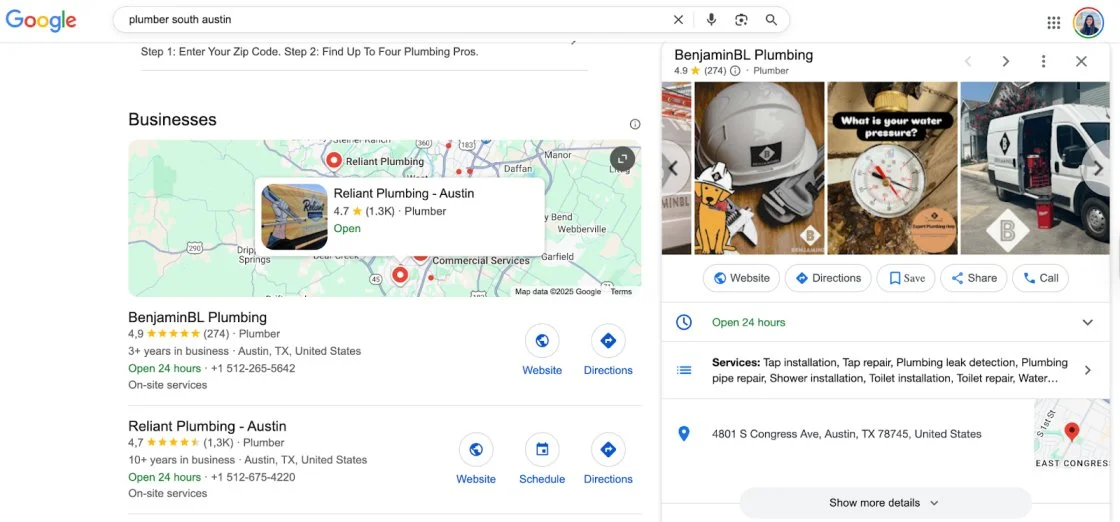
You can also reuse these photos in smart ways:
- Add them to the bottom of your landing pages
- Include them in retargeting ads to build trust
- Attach them to estimates or quote emails (“Here’s a similar job we completed last week”)
It’s simple proof of work, and it builds credibility faster than reviews alone.
9. Add a “Quick Quote” Flow to Capture Low-Effort Leads
Some people aren’t ready to call. They don’t want to explain the whole situation — they just want to know, roughly, what it’ll cost. If your site only offers a phone number or a full booking form, you’ll lose these leads.
Instead, try offering a “Quick Quote” option, something like:
“Tell us what’s going on, and we’ll text you a price range in under 15 minutes.”
It’s low pressure. It feels fast. And it pulls in leads who would’ve otherwise bounced. Here’s how to set it up:
- Add a button on your landing page that opens a mini form
- Ask for: issue type, zip code, optional photo upload, and phone number
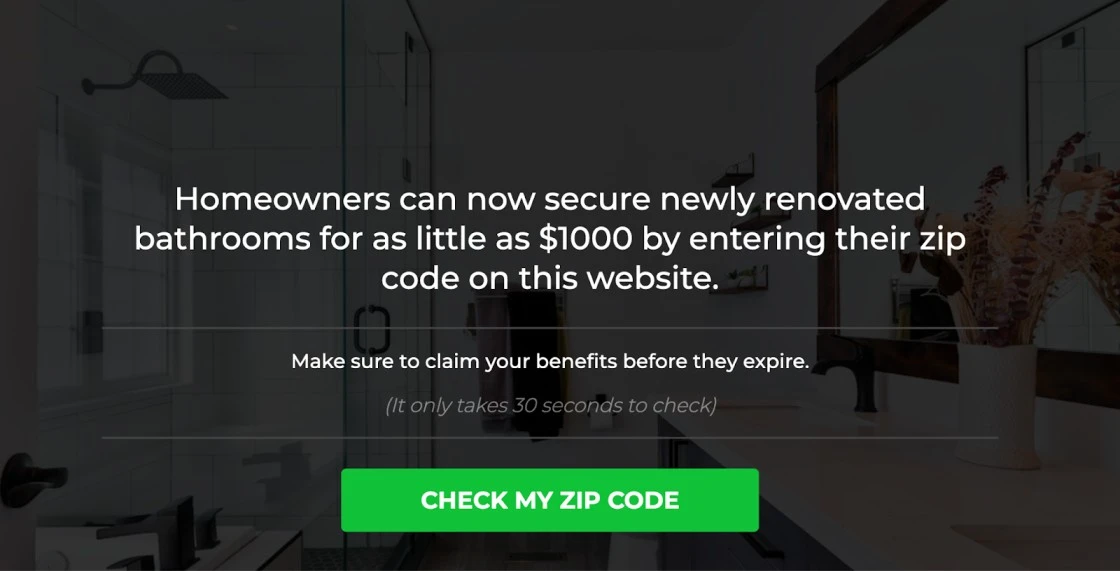
- Set up an auto-reply text confirming receipt (“Got it! We’ll send your estimate shortly”)
- You can even pre-build price ranges per issue type to reply faster
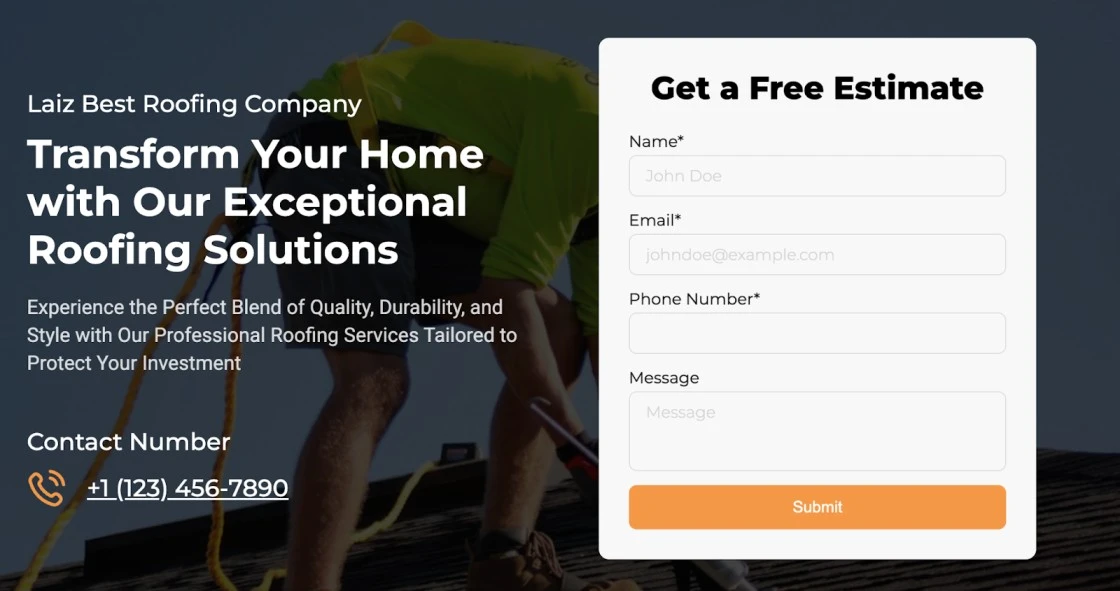
It doesn’t replace a real quote, but it starts the conversation. And that’s all you need to win the job.
10. Collect Reviews the Right Way (and Use Them Where They Matter)
Most plumbers know reviews are important, but few go beyond Google. And even fewer use reviews as part of their lead generation system.
Here’s how to do it right:
Step 1: Ask at the right moment
The best time to ask is right after a successful job, especially if you just solved an emergency or finished faster than expected. Keep it simple:
“Glad we got that fixed up. Would you mind leaving a quick review? It really helps local folks find us.”
Text them a link directly. Don’t make them search for your profile.
Step 2: Add reviews to your landing pages
Don’t just let reviews live on Google. Grab 2–3 great ones and place them on every service-specific page (like your “Clogged Drain Repair” or “Emergency Pipe Fix” page). Bonus if the review mentions:
- The type of problem you solved
- How fast you showed up
- How easy the booking process was
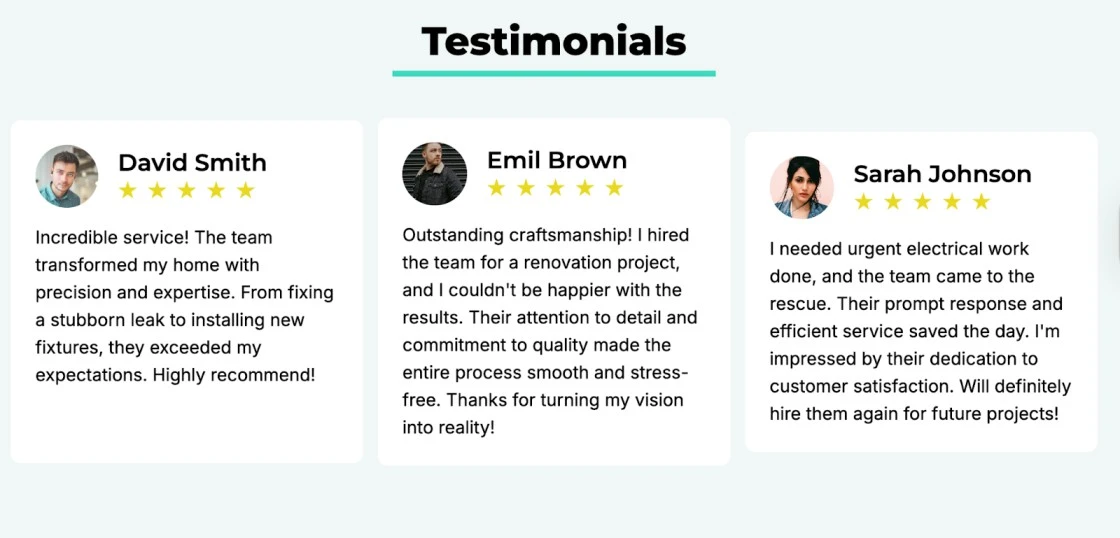
Step 3: Use location-based reviews for SEO
A review that says, “Fixed my busted water heater in North Austin in under 2 hours” does more than build trust. It actually helps you rank for “water heater repair North Austin.” Google reads it like content.
11. Build a Seasonal Service Page (Before Everyone Else Does)
A lot of plumbing jobs spike at very specific times of year, like:
- Frozen pipe repairs in winter
- Outdoor faucet and sprinkler issues in spring
- Water heater tune-ups before the holidays
- Sewer line problems during heavy rain seasons
Instead of waiting for that flood of calls, build a landing page 4–6 weeks in advance targeting that seasonal problem, and start ranking or running ads early.
Here’s what to include:
- A headline tied to season + issue: “Frozen Pipes? We’re On-Call 24/7 in [City] This Winter”
- Limited-time offer: “Winter Tune-Up Special – $79 until Jan 31”
- Short checklist: signs of the problem, what to look for, when to call
You can also reuse that page each year, just update the dates and testimonial examples. It becomes part of your annual lead-gen engine.
Turn Traffic Into Booked Jobs
The strategies above work. But only if your website or landing page is fast, focused, and built to convert — especially on mobile, where most plumbing leads start.
That’s where LanderLab helps.
With LanderLab, you can:
- Build issue-specific landing pages in minutes (no developer needed)
- Set up mobile-first forms and call buttons that convert emergency searches
- Add retargeting pixels, testimonials, and smart forms with ease
- Create seasonal or partner-specific pages to catch leads that others miss
It’s simple, fast, and built for local businesses who want leads, not just traffic.
Start Building Plumbing Landing Pages
Create landing pages that bring in plumbing leads fast with LanderLab. Build pages for emergency services, quotes, or repairs with no coding required.
FAQs About Plumbing Lead Generation
What’s the fastest way for plumbing business owners to get exclusive plumbing leads?
The quickest way is to combine paid ads with a fast, mobile-optimized landing page targeting relevant keywords. Pairing this with local keyword research and retargeting campaigns can help generate quality plumbing leads directly, instead of competing for shared leads from plumbing lead generation companies.
How can a small plumbing business generate high-quality leads without spending a fortune?
Leverage social media platforms, positive customer reviews, and Google’s organic search results through search engine optimization. Posting before-and-after photos, sharing customer satisfaction stories, and engaging with existing customers can drive free plumbing leads while building trust with potential plumbing customers.
Do lead generation strategies work for commercial plumbing services?
Yes. Commercial plumbing services can use the same lead generation efforts as residential plumbers, but with a focus on qualified leads from property managers, contractors, and local professionals. Using a lead generation company that specializes in commercial jobs can deliver exclusive plumbing leads directly to your inbox.
How do plumbing contractors turn leads into paying customers?
Plumbing contractors convert plumbing leads by following up quickly, offering reliable plumbing services, and maintaining a strong reputation with satisfied customers. Using plumbing software to track leads, running targeted ad campaigns, and sponsoring local events can all increase the chances of turning valuable leads into a steady flow of new customers.

